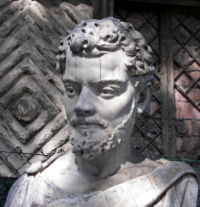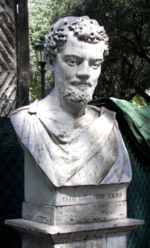Lucretius
From Epicurus Wiki

Very little is known about his life. The only contemporaneous reference to him is the praise of Cicero where he says poemata, ut scribis, ita sunt: multis luminibus ingeni, multae tamen artis. Sed cum Veneris. that is, "[his] the poetry is, as you say in your letter, rich in brilliant genius, yet highly artistic. But with racy passages" (Cic. ad Qu. fr. 2,9,3).
Aelius Donatus, constructing a biography of Virgil in the late 4th century AD, references Lucretius, Initia aetatis cremonae egit usque ad uirilem togam, quam xvii (septimo decimo) anno natali suo accepit isdem illis consulibus iterum, quibus erat natus, euenitque ut eo ipso die Lucretius poeta decederet that is “he [Virgil] spent the first years of his life at Cremona, until he assumed the toga of a man, which he received the seventeenth year after his birth, at which time those same two men were consuls; as it happened, the poet Lucretius passes away that same day.” (Aelius Donatus, Life of Virgil, XX).
A student of Aelius Donatus, St. Jerome, who attempted to record Roman history around 382 CE, elaborates saying Titus Lucretius poeta nascitur, postea amatorio poculo in furorem uersus cum aliquot libros per interualla insaniae conscripsisset, quos postea cicero emendauit, propria se manu interfecit anno aetatis XLIIII [Chron. Euseb., VII, 1; possibly from Svetonius' De Viris Illustribus] meaning, "The poet Titus Lucretius was born. He was driven mad by a love potion and, having composed – in the intervals of his insanity – several books which Cicero afterwards corrected, committed suicide in his forty-fourth year." (St. Jerome, Chronological Tables, CLXXI; but Lactantius, writing about pagan suicides, doesn't refer to Lucretius).All else we can know must be inferred from the poem itself, e.g. he was evidently well-educated and possessed broad knowledge of both Greek and Roman literature; he was apparently familiar with both city and country life.

